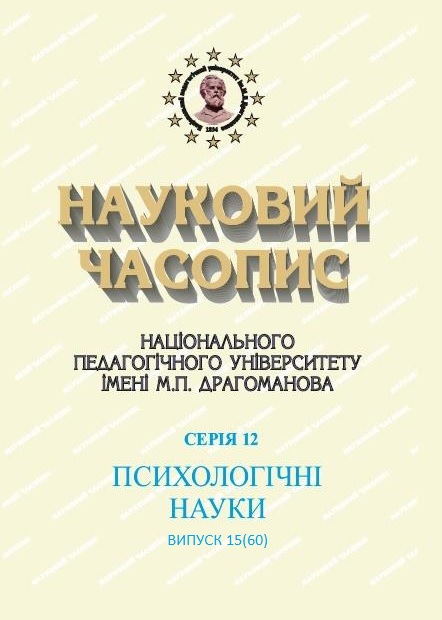THE PSYCHOLOGICAL ASPECTS OF INTERSUBJECTIVE INTERACTION (TO THE ISSUES OF THEORETICAL ANALYSIS)
DOI:
https://doi.org/10.31392/NPU-nc.series12.2021.15(60).09Keywords:
interaction, activity, subject, reciprocity, intersubjectivity, personality.Abstract
The article explores interaction as a complex interfunctional psychological system of interpersonal connections and actions that provide reciprocity as internal feature of interaction and common task performance as external one. It is proven that interaction includes two basic aspects, namely reciprocity and joint activity. Reciprocity underlines close connection of participants, while joint activity shows directional multiplicity of possible specific-vital content of interpersonal interaction. Thus important thing is that anything a human being could experience or think of may become both interaction matter and task performed by its participants. Various aspects of pedagogical interaction are studied, particularly mutual judgement-based evaluations of both teachers and students. It is mentioned that interaction is studied by psychological science in many contexts and aspects, from neurobiological to a social one. It is underlined that interaction as human existence taken for granted underlines that individuals can’t function in isolation. In particular, the article raises an issue of negative effects of loneliness on human health coupled with hypothesis of corresponding positive effects of interpersonal interaction on mental and somatic health of elderly people. Social brain hypothesis is analyzed in conjunction with interaction concept. Strong methodological connection of interaction as category with categories of activity and practice is outlined, as well as with the concept of reciprocity in human culture. It is argued that dialectical unity and counteraction of personal relations and actions come forward as a psychological mechanism of human interaction. Scientific development of psychological concept of interaction is important because different types of psychological practices inevitably assume interpersonal cooperation between psychologist(s) and client(s). Therefore, successful cognition of psychology of interaction means also better organization of professional activity of a psychologist as the person obliged to co-operate with others for their good.
References
- Ball, G. O. (2016). Uspіshnіst obdarovanoji ljudini u kontekstі jiji vzajemodіji іz socіokulturnim seredovishhem [The successfulness of a gifted person in the context of his/her interaction with the sociocultural environment]. Psihologіja osobistostі, 1(7). Retrieved from http://nbuv.gov.ua/UJRN/Po_2016_1_3 [in Ukrainian].
- Bern, E. (2016). Іgri, u jakі grajut ljudi [Games peolple play]. Harkіv : Knizhkovij klub “Klub sіmejnogo dozvіllja” [in Ukrainian].
- Bіlodіd, І.K. (Ed.). (1970). Slovnik ukrajinskoji movi [Dictionary of Ukrainian Language]
(Vol. 1). Kyiv : Naukova dumka [in Ukrainian]. - Bulah, І.S. (2012). Metodichnі zasadi vzajemodії psihologa-konsultanta і klіjenta [The methodic foundations of the counselling psychologist’s and client’s interaction]. Mіzhnarodnij naukovij forum: socіologіja, psihologіja, pedagogіka, menedzhment [International Scientific Forum: Sociology, Psychology, Pedagogics, Management], 9, 13–22. Retrieved from http://nbuv.gov.ua/UJRN/Mnf_2012_9_4 [in Ukrainian].
- Vazjulin, V.A. (2006). Logika istorii vzaimodejstvija morali i politiki [The logics of history of interaction of morality and politics]. Marksizm i sovremennost, 4(38), 35–37 [in Russian].
- Vlasenko, V.V. (1995). Vchitelі – uchnі: psihologіja vzaєmnih ocіnnih stavlen [Teachers – pupils: the psychology of mutual evaluative attitudes]. Kyiv : UDPU і M.P. Dragomanova [in Ukrainian].
- Vygotskij, L S. (1983). Istorija razvitija vysshih psihicheskih funkcij [The history of development of higher pshychological functions]. Sobranie sochinenij. (Vol. 3). Moscow : Pedagogika [in Russian].
- Kant, I. (2020). Osnovy metafiziki nravstvennosti [The basis of metaphysics of morality] (Vol.4). Andronum [in Russian].
- Kolomіjec, N. (2018). Teoretichnij analіz ponjattja “vzajemodіja” [The theoretical analysis of “interaction” concept]. Psihologo-pedagogіchnі problemi sіlskoji shkoli, 58, 112–119 [in Ukrainian].
- Confucius (2018). Aforizmi ta vislovi [Aphorisms and quotes]. Harkіv : Vivat [in Ukrainian].
- Koc, M. (2020). Psihologіchnij analіz reguljacіji profesіjno-komunіkativnogo potencіalu majbutnogo vchitelja jak sub’jekta pedagogіchnoi vzajemodіji [The psychological analysis of professional-communicative potential of the future teacher as a subject of pedagogical interaction]. Psihologіja: real'nіst' і Zbіrnik naukovih prac RDGU, 15, 77–83 [in Ukrainian].
- Krimskij, S. (2009). Rankovі rozdumi [Morning speculations]. Kyiv : Majsternja Bіleckih [in Ukrainian].
- Losev, A.F. (2014). Dialektika mifa [The dialectics of myth]. Saint Peters burg: Azbuka,
Azbuka – Attikus [in Russian]. - Maksimenko, S.D. (2016). Ponjattia osobystosti u psychologii [The notion of personality in psychology]. Psihologija i osobystist, 1(9), 11–17. Retrieved from http://nbuv.gov.ua/UJRN/Psios_2016_1_3 [in Ukrainian].
- Mid, Dzh. G. (2014). Filosofija nastojashhego [The philosophy of the present]. Moscow : Vysshaja shkola jekonomiki (Gosudarstvennyj universitet) [in Russian].
- Shinkaruk, V.І. (Ed.). (2002). Fіlosofskij enciklopedichnij slovnik [The philosophical encyclopedic dictionary]. Kyiv : Abris [in Ukrainian].
- Beller, J., & Wagner, A. (2018). Loneliness, social isolation, their synergistic interaction, and mortality. Health Psychology, 37(9), 808–813.
- Coutinho, J., Silva, P., & Decety, J. (2014). Neurosciences, empathy, and healthy interpersonal relationships: Recent findings and implications for counseling psychology. Journal of Counseling Psychology, 61(4), 541–548.
- Cozolino, L. (2006). The neuroscience of human relationships: Attachment and the developing social brain. New York : W W Norton.
- Dunbar, R.I.M. (2012). The social brain meets neuroimaging. Trends in Cognitive Sciences, 16, 101–102. https://doi.org/10.1016/j.tics.2011.11.013
- Frith, C.D. (2007). The social brain? Philosophical Transactions of the Royal Society B: Biological Sciences, 362, 671– 678. doi:10.1098/rstb.2006.2003
- Gallese, V., Fadiga, L., Fogassi, L., & Rizzolatti, G. (1996). Action recognition in the premotor cortex. Brain, 119, 593– 609.
- Vasiutynskyi, V. (2020). Gender differences in experiencing and coping with a sense of guilt in interpersonal and intergroup relations. Education: Modern Discourses, 3, 143–152. https://doi.org/10.37472/2617-3107-2020-3-14

